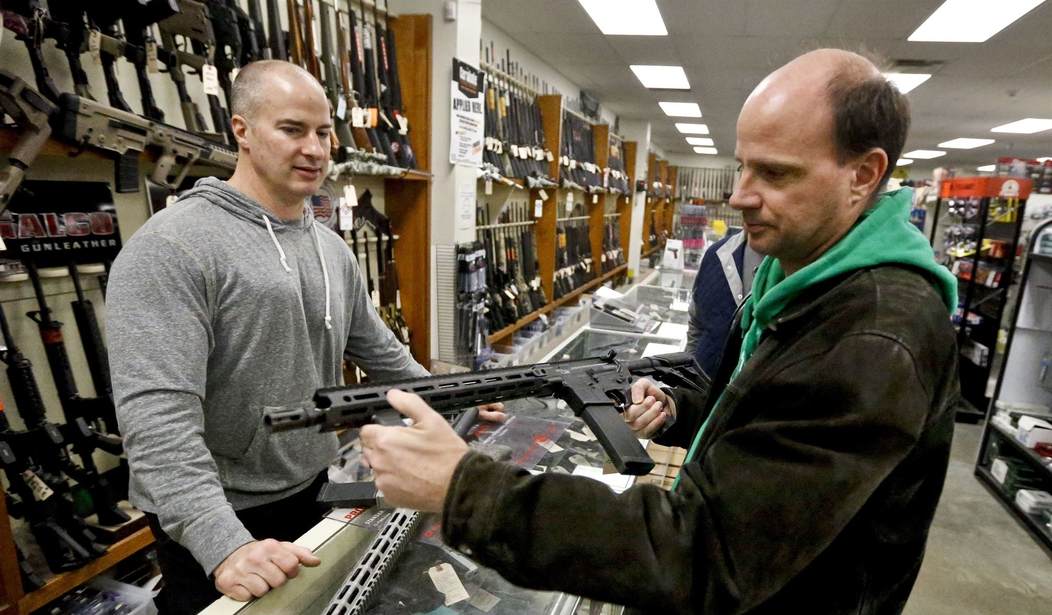A group of lawmakers in Georgia is calling for changes to the state's gun laws in the wake of the shooting at Apalachee High School earlier this year, including a 10-day waiting period on the sale of some semi-automatic firearms.
The Senate Study Committee on Safe Firearm Storage chaired by Democrat Sen. Emmanuel Jones released its final report on Thursday. While some of the recommendations could find broad bipartisan support, measures like the waiting period are likely to run into stiff resistance in both the Senate and House.
"We can do a much better job in Georgia, and we have to do a better job," Jones told reporters.
The committee's recommendations include a statewide alert protocol requiring that when a student has been flagged for potentially dangerous behavior tries to transfer schools, the new school is notified of the issues before the student is enrolled.
The committee also recommended the implementation of Child Access Prevention laws which would include civil and criminal penalties, and a 10-day waiting period for the purchase of assault rifles unless the person has a weapons carry license.
"I believe we can get all of these things passed," Jones said.
I would be surprised if that ends up being the case. Alerting schools to the transfer of a potentially dangerous student is probably the easiest recommendation to implement, but changes to the state's gun storage laws and a 10-day waiting period for modern sporting rifles for those without a concealed carry license are going to face more difficult pathways in the legislature.
The one change to gun storage laws that's could get traction in both chambers would be a minor tweak to existing statute, which makes it unlawful for any person to intentionally, knowingly, or recklessly furnish a handgun to a minor. Replacing "handgun" with "firearm" wouldn't impose a one-size-fits-all storage mandate on gun owners across the state, and I could see Republicans signing off on that change.
Legislation targeting semi-automatic rifles, on the other hand, is far more likely to draw the ire of Republican lawmakers, who hold a sizeable majority in both the House and Senate. In addition to the waiting period suggested by the Senate committee, Democrats plan on introducing at least one other bill focused on modern sporting rifles. State Rep. Mary Margaret Oliver wants owners of so-called assault weapons to have a liability insurance policy.
"A new idea has come forward in other states that says if you are going to own an assault weapon, legally own an assault weapon, you have to provide insurance for the damage that weapon may cause," Oliver said. "All of us are focused on the danger that our children face in schools, in their apartment complexes. Every weekend there's a murder with irresponsible, criminal use of guns."
I don't know if Oliver is aware of this, but criminal acts aren't covered by liability insurance policies. Requiring gun owners to pay for such a policy is impractical, and likely unconstitutional as well. There aren't a lot of these laws on the books, but one insurance mandated put in place in San Jose, California was upheld by a federal judge last year, who ruled that the provision didn't violate the Second Amendment because "purchase of insurance does not restrict firearm possession or use". The judge went on to say that even if the insurance mandate did implicate the Second Amendment rights of San Jose residents, it fits within the national tradition of gun regulation because it's akin to 19th-century surety laws that, "typically required certain individuals to post bond before carrying weapons in public if there was 'reasonable cause' to fear these individuals would cause injury or breach of the peace."
The difference between San Jose's mandate and those surety laws is significant: San Jose requires every gun owner to purchase a liability insurance policy not just "certain individuals" when authorities had reasonable cause to believe they would cause injury. I don't think the surety laws are analogous at all, frankly, and the judge in California's opinion wouldn't be precedential if Georgia imposes an insurance mandate of its own.
The Democrats' proposed changes to Georgia's gun laws aren't assured of passage, but Second Amendment advocates can't be complacent either. Georgia's a red state, just like Florida was in 2018, and that didn't stop anti-gun advocates from getting a "red flag" law and a ban on gun sales to young adults from being enacted. The gun control lobby suffered historic setbacks at the federal level on Election Day, and that means they'll be putting more emphasis on their state-level efforts over the next few years... including ostensibly 2A-friendly territory.








Join the conversation as a VIP Member